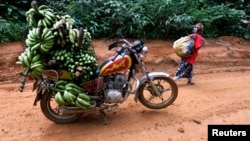YAOUNDE —
Central Africa remains one of the poorest regions in the world, with 70 percent of the population living on less than $1 a day and 30 percent of the people going hungry.
The Central African Economic and Monetary Community, CEMAC, has done little to make a dent in rampant poverty since the six-nation grouping was formed in 1994.
Paul Tasong, CEMAC’s commissioner for monetary, economic and financial policies, tells VOA the African sub-region remains poor due to a lack of political will towards more effective integration.
"We have several shortfalls," he said. "Don't forget that when we talk about integration it is a question of trade-off between sovereignty and regional concerns. This is where the greatest challenge is getting the various countries to drop off a bit of their sovereignty. Central Africa is the slowest of the sub-regions in terms of economic growth and paradoxically the most endowed in terms of natural resources."
Economic growth was just 2.2 percent last year - 50 percent less than forecast - in the bloc comprising Gabon, Cameroon, the Central African Republic, Chad, the Republic of Congo and Equatorial Guinea.
Paul Tasong says another problem is misallocation and duplication of development resources - such as on unprofitable infrastructure projects.
"If you look at what the government of Cameroon is putting in to construct a deep sea port - and you imagine that all the countries that have a sea front in the sub region want to go into the same exercise of constructing a deep sea port - then you will see how much waste that could be. Otherwise it's much more profitable for all the countries to share infrastructure in such a way that if we are able to have one deep seaport in the sub-region all the countries can share and redirect their own resources in putting in place other infrastructure which could be shared," said Tasong.
CEMAC nations have many projects that have never gotten out of the planning stages - like the creation of a regional airline, a stock exchange and a biometric passport system which was supposed to be implemented in January to facilitate the free movement of people.
Pierre Moussa, president of the CEMAC commission, says the goal of a functioning common market and customs union remains distant, leaving tens of millions of people mired in poverty.
He says Central African states must realize that integration is not a threat to sovereignty but is necessary to boost the trade which will increase living standards.
The Central African Economic and Monetary Community, CEMAC, has done little to make a dent in rampant poverty since the six-nation grouping was formed in 1994.
Paul Tasong, CEMAC’s commissioner for monetary, economic and financial policies, tells VOA the African sub-region remains poor due to a lack of political will towards more effective integration.
"We have several shortfalls," he said. "Don't forget that when we talk about integration it is a question of trade-off between sovereignty and regional concerns. This is where the greatest challenge is getting the various countries to drop off a bit of their sovereignty. Central Africa is the slowest of the sub-regions in terms of economic growth and paradoxically the most endowed in terms of natural resources."
Economic growth was just 2.2 percent last year - 50 percent less than forecast - in the bloc comprising Gabon, Cameroon, the Central African Republic, Chad, the Republic of Congo and Equatorial Guinea.
Paul Tasong says another problem is misallocation and duplication of development resources - such as on unprofitable infrastructure projects.
"If you look at what the government of Cameroon is putting in to construct a deep sea port - and you imagine that all the countries that have a sea front in the sub region want to go into the same exercise of constructing a deep sea port - then you will see how much waste that could be. Otherwise it's much more profitable for all the countries to share infrastructure in such a way that if we are able to have one deep seaport in the sub-region all the countries can share and redirect their own resources in putting in place other infrastructure which could be shared," said Tasong.
CEMAC nations have many projects that have never gotten out of the planning stages - like the creation of a regional airline, a stock exchange and a biometric passport system which was supposed to be implemented in January to facilitate the free movement of people.
Pierre Moussa, president of the CEMAC commission, says the goal of a functioning common market and customs union remains distant, leaving tens of millions of people mired in poverty.
He says Central African states must realize that integration is not a threat to sovereignty but is necessary to boost the trade which will increase living standards.







